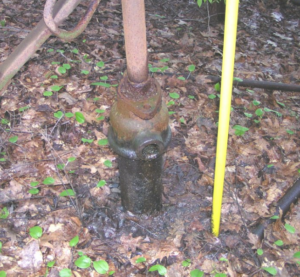
Pennsylvania has at least 200,000 orphaned and abandoned oil and gas wells, which each leak up to 419 pounds of methane annually. Their operators left these wells unplugged after extraction, and, usually, it becomes up to the State to plug them using taxpayer money. To help cover the enormous cost, the Infrastructure Investment and Jobs Act (“IIJA”) included a $4.7 billion investment for plugging orphaned and abandoned oil and gas wells across the nation.
Last month, we made you aware of a letter the United States Department of the Interior (“DOI”) sent to the Pennsylvania Department of Environmental Protection (“DEP”). The letter informed DEP that the orphaned and abandoned oil and gas well-plugging grant program contained within Pennsylvania House Bill (“HB”) 2644 – which became law in July – could be inconsistent with provisions of the IIJA.
Check out this blog to learn more about HB 2644 and this one to learn more about the DOI Letter.
DOI was concerned that the grant program would not comply with the IIJA’s requirements for minimum wage or the use of American-made iron, steel, manufactured products, and construction materials in all federally funded projects. There were three solutions Pennsylvania could have pursued: 1) DEP could spend the money in a way that was compliant with both federal and state law without passing regulations or legislation; 2) the legislature could introduce a bill or amend the bill to fix the problem, or; 3) DEP could spend the money in a way that was not in compliance with federal law.
The General Assembly decided to take the second approach and attached the necessary legislative fix to a related bill that was already moving – HB 2528.
HB 2528 was introduced on April 20, 2022, in the House as a bill to prioritize Pennsylvania companies when awarded contracts to plug orphaned and abandoned oil and gas wells in the State. It passed the House and made it through first and second consideration in the Senate before being sent back to the Senate Energy and Environmental Resources Committee, where it was first amended to reflect the bill’s current language on October 25. It was reported out of committee and amended one more time on third consideration before passing the Senate and the Concurrence Vote in the House. Governor Wolf signed the bill on November 3.
Our legislators did two things to fix the lingering problems. To ensure contractors can pay their employees and subcontractors the prevailing minimum wage, the General Assembly agreed to raise the grant amounts to $40,000 for wells less than 3,000 feet deep and $70,000 for wells more than 3,000 feet deep. That is up from $10,000 and $20,000, respectively. The General Assembly also included a requirement that any money they distribute from the IIJA to plug orphaned and abandoned oil and gas wells must be spent in a way that complies with applicable federal requirements.
These small changes to Pennsylvania’s orphaned and abandoned well-plugging program will ensure the state receives the funding we are allocated from the federal government – $330,626,000 – to complete the task. Without this massive investment, Pennsylvania would have to find the money within our budget to solve the problem, which would stunt our potential to plug the many orphaned and abandoned oil and gas wells across the state.
Usually, pushing legislation through this quickly without community input would cause alarm. However, in this scenario, it may have been exactly what we needed the General Assembly to do. Without this legislation, our funding to plug orphaned and abandoned gas wells would still be in jeopardy.

Nina-
Thank you for the excellent article.
If a property has an old well that has stopped producing commercial quantities of gas, who should be contacted first to inquire about access to grant money to plug the well?
Hi Justin! Thanks for your question!
The company responsible for the well is responsible for plugging it. If you believe the company abandoned the well without it plugging it, contact the Department of Environmental Protection to ensure that it has been properly identified and that any potential environmental, health and safety issues are addressed, as resources allow. Call the office closest to your home: Meadville District Office: 814.332.6860; Williamsport District Office: 570.327.3636; Pittsburgh District Office: 412.442.4024; Central Office: 717.772.2199.